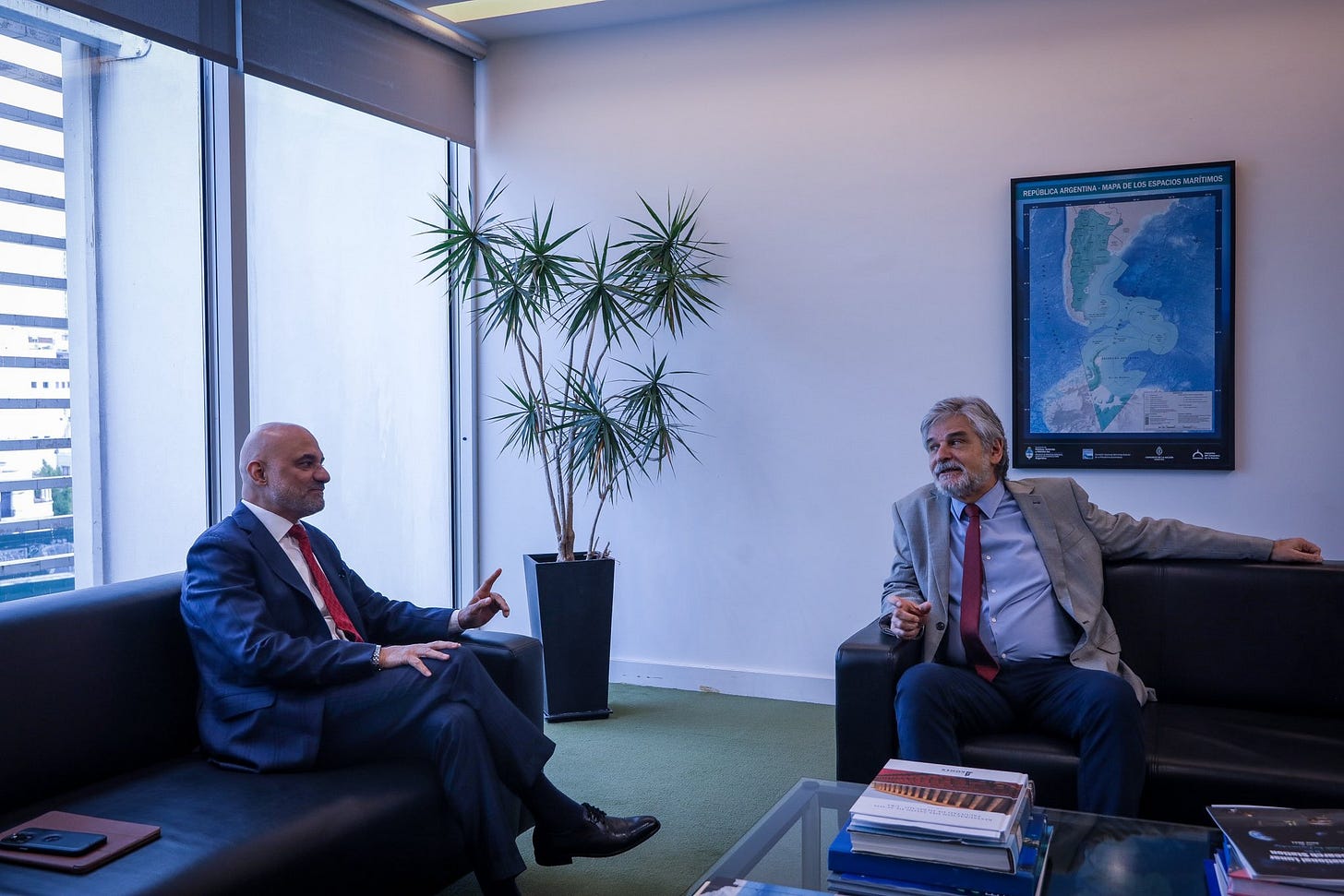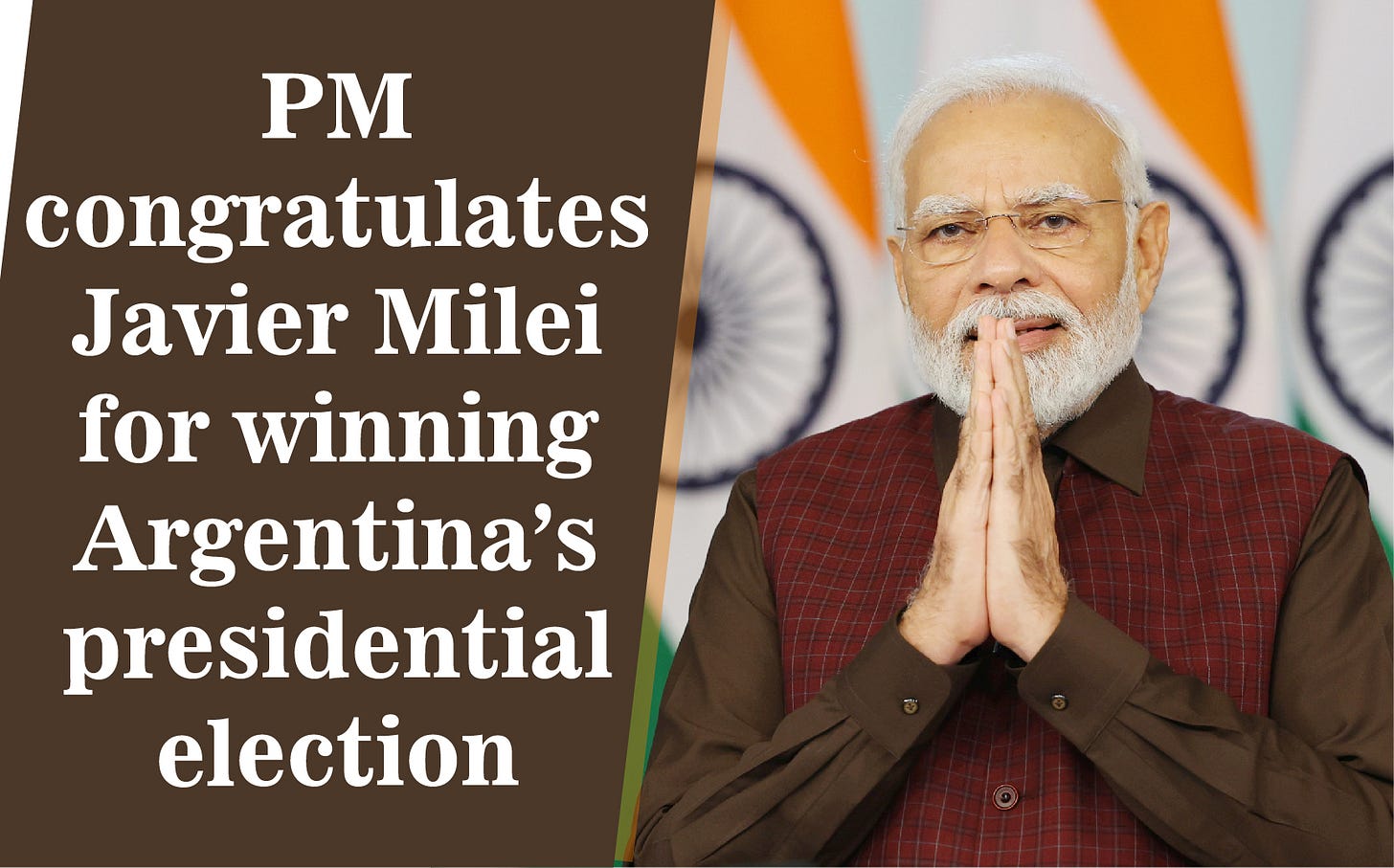Argentina's Presidential Poll: The Right Wing Soars
Shocking Defeat for Frontrunner Sergio Massa, the Center-Left Economy Minister, Amidst Severe Economic Crisis. Opportunity for India.
Argentina's Geographical and Cultural Context
Argentina, the largest country in South America after Brazil, with a population of approximately 46 million, has long been recognized in global contexts for various reasons. In India, it's often synonymous with the legendary soccer hero Diego Maradona or remembered for its role in the Falkland War during the Thatcher era. Despite its considerable size and cultural impact, Argentina has seen little migration from Punjab, likely due to its Spanish-speaking nature and geographical distance.
Introduction to the Election Outcome
In a historic election, Argentina has taken a sharp turn to the right with the election of Javier Milei, a far-right libertarian and admirer of Donald Trump. Securing nearly 56% of the vote, Milei's victory signifies the most dramatic rightward shift in the country's democratic history spanning four decades. His opponent, Sergio Massa, conceded defeat in a contest overshadowed by the country's severe economic challenges.
Trump's Endorsement and Milei's Victory
Former U.S. President Donald Trump extended his congratulations to Milei, indicating his support and positive outlook for Argentina under the new leadership. The election results underscore a public outcry for change amidst escalating economic woes, including rampant inflation and a poverty rate affecting over 40% of the population. Milei, with no prior governing experience, has pledged a complete overhaul of the existing political framework, focusing on liberty and economic reform.
Transformative Changes in offing, including “dollarization”
In his victory speech, Milei pledged to terminate the period of economic downturn and steer Argentina towards a model of liberty. His campaign resonated with voters eager for radical transformation, underscored by his commitment to substantial economic reforms and substantial cuts in public spending. This included his proposal for the "dollarization" of the currency system, coupled with the elimination of the country's Central Bank. This strategy, as described by his supporters, is akin to "chemotherapy for a patient diagnosed with cancer," indicating a drastic but necessary measure to rejuvenate Argentina's ailing economy.
The Fall of Sergio Massa
Sergio Massa, the center-left economy minister, epitomized the ruling elite in Argentina. Despite attempts to distance himself from the current government's unpopularity, Massa's campaign could not sway the electorate's overwhelming desire for a new direction, culminating in his defeat and marking the end of a significant political era.
The Implications of Milei's Presidency
Milei's ascendancy signals a new chapter in Argentine politics, potentially establishing far-right governance in one of Latin America's key economies. This development could create regional tensions and alter Argentina's international relations, particularly with major partners and influential nations like China.
India-Argentina Bilateral Relations: Leveraging G20 Leadership for Enhanced Cooperation
a.) Economic Relations in the G20 Context
India and Argentina, both participants in the G20, have a unique opportunity to deepen their economic relations amidst the changing global landscape. Argentina's new leadership under Javier Milei could open fresh avenues for trade and investment. India, known for its robust technology and pharmaceutical sectors, could find synergies with Argentina's strong agricultural and mining sectors, particularly in areas like lithium mining, crucial for India's growing electric vehicle market. The G20 platform offers a conducive environment for both nations to explore joint ventures and investment opportunities, enhancing their trade relationship beyond the current $6.4 billion mark. This collaboration could be pivotal in elevating India to one of Argentina's top trading partners, fostering a mutually beneficial economic relationship.
b.) Expanding Investment and Commerce
With India's growing global economic footprint and Argentina's vast resources and emerging market potential, the two countries are well-positioned to capitalize on investment and commerce opportunities. Indian investments in Argentina already exceed $1 billion across various sectors, indicating strong confidence in the Argentine market. Under Milei's presidency, which promises economic reforms and openness to international trade, there is potential for significant growth in bilateral investments. This new era could see enhanced cooperation in sectors like information technology, pharmaceuticals, and renewable energy, driven by Argentina's need for technological advancement and India's expertise in these areas.
c.) Cultural Relations and People-to-People Ties
The cultural bond between India and Argentina, although geographically distant, is remarkably strong. The popularity of Indian spiritual practices, yoga, and philosophy in Argentina presents an opportunity to further these ties under the new leadership. Milei's presidency, which advocates for a break from traditional politics, may be more receptive to cultural exchanges that promote mutual understanding and respect. Leveraging this aspect, India can initiate more cultural events, academic exchanges, and collaborative projects in the fields of art, literature, and education, thus cementing a deeper, more comprehensive bilateral relationship.

A New Chapter in India-Argentina Relations Amidst Argentina's Economic Overhaul
As Argentina grapples with formidable economic and social challenges, including a prolonged period of economic stagnation, rampant poverty, and soaring inflation, the administration of President Milei finds itself at a critical juncture. The success of Milei's radical reform agenda and his ability to adeptly navigate Argentina's complex political terrain will significantly impact the nation's future. Concurrently, this period of transition presents a unique opportunity for India, under its expanding global influence and strategic G20 role, to forge a stronger bilateral relationship with Argentina.
With Argentina's new government gearing up for anticipated economic reforms, a landscape ripe for collaborative endeavors is unfolding. This scenario holds the promise of mutual benefits in trade, investment, and cultural exchange. The prompt congratulatory message from Prime Minister Narendra Modi to the new leadership in Argentina is a clear testament to India's eagerness to embark on a revitalized partnership. This proactive gesture reflects India’s commitment to fostering a dynamic and mutually beneficial relationship. By effectively addressing existing challenges and capitalizing on emerging opportunities, India and Argentina are poised to elevate their partnership to extraordinary heights. Such a development would not only bring substantial advantages to both nations but also signify their joint progression in an ever-more interconnected global arena.







